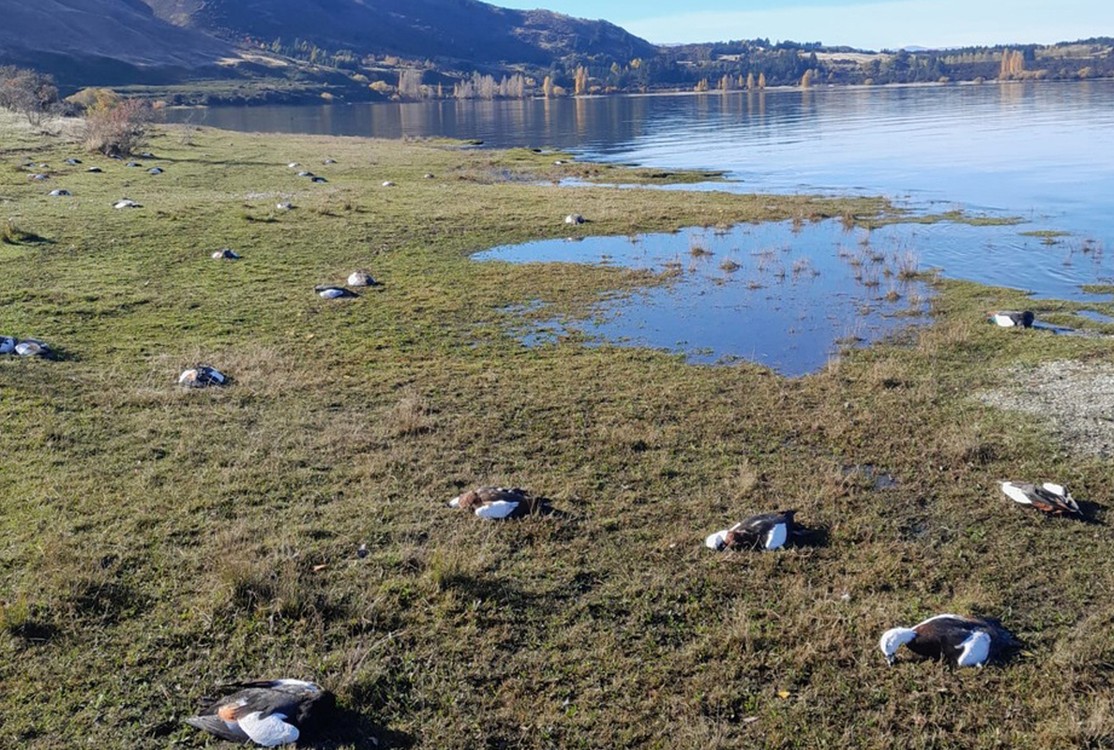Mass Paradise Shelduck deaths in Te Anau & Wanaka - poisoning suspected

by Rosie Fea - Southland App
Serious concern continues to grow across the Southland and Otago regions after a further 64 paradise shelducks have been discovered mysteriously dead on the foreshore of Lake Te Anau, just weeks after an initial 100 birds were collected from Dublin Bay, at Lake Wānaka, last month.
The Ministry of Primary Industries’ biosecurity group declared the bird bodies free from any exotic disease as the cause of death, following initial testing soon after the first incident occurred. Now, however, with no further answers or clear resolve as to what is causing the deaths, serious questions around poisoning due to insecticide application have begun to arise. Otago Fish & Game Chief Executive Ian Hadland is extremely concerned by the mass bird deaths. “It is important to know the cause of any mass death of wildlife, especially native bird species,” Mr Hadland said. “We suspect the insecticide diazinon is to blame for recent mass bird mortalities at Wānaka and near Te Anau, but we need this confirmed.”
Diazinon is an organophosphate that is an active ingredient in some insecticides used to control grass grub, porina and other pests. In the Environmental Protection Authority’s guidelines for safely using diazinon, it is stated as ‘toxic to the environment, especially to insects, birds, fish, other aquatic creatures and bees.’ Sheep and cattle have low susceptibility if ingested, but anything else low to the ground eating the grass can of course end up being killed unintended. While there is no suggestion the recent mass bird kills were intentional, it is apparent that testing to confirm is necessary to encourage conversation around the permitted use of this product in our country, one that has been banned from agricultural products in the European Union since 2007.
In a written statement to the Southland App, EPA said a 2013 review had decided that the use of products that contained diazinon presented risks to human health and to the environment and needed to be phased out.
They said that from 1 July 2028, people will not be able to import, manufacture or use products containing diazinon, and all existing stocks will need to have been disposed of.
With MPI stating they will not elect to conduct further testing beyond identifying the cause not being related to any exotic disease, Otago and Southland Fish & Game regional councils remain dismayed, and furious, as they await results to verify whether or not the mass deaths can be linked to the ingestion of diazinon without governmental support. “It’s unacceptable that a not-for-profit organisation like Fish & Game has to use licence holder funds to mop up an incomplete investigation by a large government department such as MPI,” says Mr Hadland. “I would have thought MPI would be as interested as us in confirming the cause of death, but unfortunately they have walked away.”
Biosecurity New Zealand deputy director-general, Stuart Anderson, says Biosecurity New Zealand’s responsibility is testing focused on exotic diseases and, as such, they are unable to comment on the likelihood of it being linked to a pesticide. Stating, “it is inaccurate to suggest MPI is “disinterested” or “has walked away.” We discussed with Fish and Game that our laboratory does not do toxicology testing, which is outside of our remit.” He also asserted that MPI’s animal welfare compliance team has an “investigation open to determine if there have been any breaches of the animal welfare act in relation to the death of the birds,” yet also stating that when it comes to the application of diazinon and other such products, “it is important that users of these products familiarise themselves with the label and follow directions.”
In a separate incident in Te Anau, a concerned landowner contacted Southland Fish & Game, disconcerted that he had accidentally poisoned shelduck through application of diazinon. Southland Fish & Game manager Zane Moss responded saying, “it’s clear from one of the farmers who contacted Fish & Game that this product is extremely toxic to birds, so to have the agency responsible deliberately ignore the risks is abhorrent.” His demand is that we not only get to the bottom of these bird deaths, but question whose responsibility this growing problem and lack of awareness should really be. “How many more poisonings will occur and what species will be involved, before the ban of this neurotoxin will be brought forward?”
DOC Operations Director Southern South Island, Aaron Fleming, says any mass mortality event involving native species is of concern to DOC. He also said whatever the cause, DOC does not have a role in regulating the use of insecticides, and referred the matter on to the EPA for further comment.








